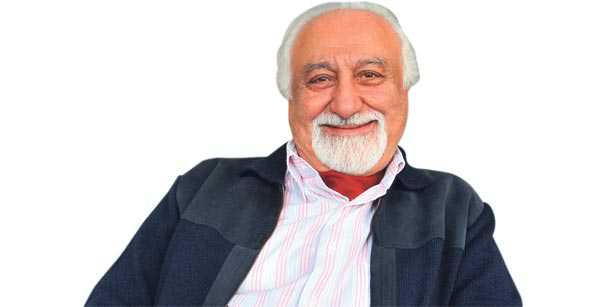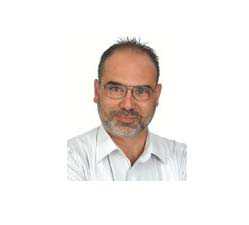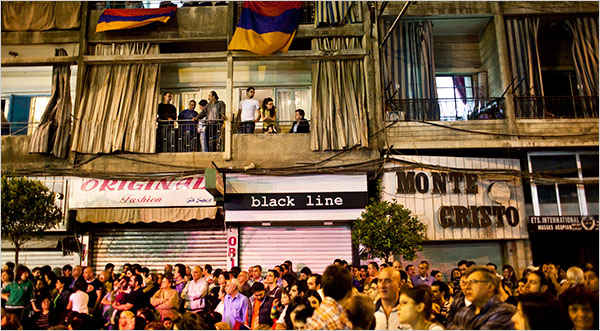| Turks and Armenians will solve their problems themselves, writer Mıgırdiç Margosyan said, pointing to the stalled top-down diplomatic process between Turkey and Armenia.
|
||||
| “A solution to the problems will come from the public of both sides and not from top officials. As long as people continue to engage in dialogue, solutions will be produced,” he told Today’s Zaman for Monday Talk.
More Turks and Armenians are involved in a range of civil society initiatives and discuss the development of joint projects, as the top-down diplomatic process between Turkey and Armenia continues to stall. The protocols signed on Oct. 10 of last year in Zurich between the two countries in order to normalize relations and open the border have yet to be ratified, the result of mutual accusations. The border between the two has been closed since 1993, when Turkey sided with Azerbaijan following the Armenian armed forces’ occupation of 20 percent of Azerbaijan in 1992 — including the Nagorno-Karabakh region.
Margosyan, who has been part of civil society initiatives, answered our questions on a range of issues, including Turkey-Armenia relations, the Ergenekon investigation, being from Diyarbakır and the long-standing Kurdish problem. In your book, you wrote that you father used to ask you, “Tell me Margos, where are you from?” Were you ever really able to answer this question? My father asked me that question when I was around 2 years old. I was not mature enough to tell him the answer, but my father used to say, “Tell me you are from Heredan [a village along the Tigris River near Diyarbakır in southeastern Turkey].” And he used to give me candy or other goodies if I was able to say it. At some point I was able to say that I am from Heredan and my father was very happy to hear that. When I think about why he attached so much importance to saying it, that was probably because of his longing for the village as he was forced to leave it in 1915. And, as a legacy of my father, I asked my children to tell me that they are from Heredan. To answer your question, today I feel like I don’t have to belong anywhere, be it Heredan, Diyarbakır, İstanbul or any other place. I see myself as a citizen of the world.
But you are probably always from Heredan… Yes, of course, I am from Heredan as I am from that place and grew up being a part of that region. Indeed, I am emotionally from Heredan. This, your connection to the land that you grew up in, is felt in many of your writings. Have you visited the place since you came to İstanbul at the age of 15? I’ve always lived Heredan in my dreams because it has always been in the stories of my elders. I’ve also dreamt of visiting the village some day. And I did about 40 years ago. It was a difficult journey because there were no proper roads. It was a simple Anatolian village on the outskirts of a mountain. I stayed there for one night. Indeed, it was the year that Sputnik was launched. Have you ever been there again? I have not but I’d like to. But it is a village that is empty because of the Kurdish problem. It is sad to see it in that empty situation. The long-standing Kurdish issue has still not been solved. It has widely been discussed these days, especially the issue of allowing education in Kurdish. What is your opinion on this issue? The mother tongue issue is really important to me. I feel it in my bones. In one of my books, “Biletimiz İstanbul’a Kesildi” (Our Ticket Was For İstanbul), I explained why I came to İstanbul from Diyarbakır. Why did I come to İstanbul? Because there was no Armenian school there, so we did not have a chance to learn Armenian in Diyarbakır. My parents sent me to the church in Diyarbakır to learn some Armenian from the priest but I was never able to learn it properly. I learned my mother tongue in İstanbul, where I had many difficulties. My Diyarbakır accent was funny to the Armenian youth of İstanbul. They would call us “Kurds.” We have to realize that nobody has a chance to determine his or her own ethnic identity. No matter where you are born, your mother’s language is your mother tongue. Having a ban on this language is something that I’ve never understood. If somebody can think and dream in one language, this language should never be banned. It’s not human to have such a ban. What language do you dream in? It depends. If I speak with certain people in Armenian in my daily life, I speak with them in Armenian in my dreams, and vice versa if I speak Turkish with the people in my daily life. You are a true bilingual then. That’s right. ‘I saw all the vandalism and chaos of Sept. 6-7’What do you remember of the Sept. 6-7 events? I was in my last year of high school when the Sept. 6-7 events took place. I was in boarding school and we were threatened with being burnt down. We never knew what was going to happen. We were worried. We felt like we had to raise a Turkish flag, and we did. As we were going through this experience, the policemen down the street did not act to stop that chaos even though it was impossible for them to not have heard about what was going on. I saw all the vandalism and chaos when I went down the street the next day. Years after those events, there have been revelations that there were horrendous plans by some dark forces within the state targeting the non-Muslims in Turkey. Were you surprised to hear about the alleged Cage Plan? As time goes on, humanity develops and we tend to think that some things that happened in the past cannot happen today because people can no longer be discriminated against just because they belong to another religion or race. And when history repeats itself, we are surprised. In 1942 a wealth tax was introduced and came as a surprise to non-Muslims. After that they probably would not have imagined that the Sept. 6-7 events could happen, but they did happen. We should never say it can never happen again. Who could have imagined that Hrant Dink would be murdered? We hope justice will be served.
Do you believe there will be justice in the end? Do you think the Ergenekon investigation is helping that process? A mentality change has probably occurred with the Ergenekon investigation. People started to understand who is really harmful to this society and to this country. There used to be a crooked mentality. Now there is an investigation into that. That investigation itself, the Ergenekon investigation, is even helping the process of understanding that crooked mentality. We hope justice will be served. In the Dink case, there has been no resolution in four years despite all the evidence. There is apparently resistance to solving the case. The forces that desire a solution of the case appear to not yet have enough power to overcome that resistance. ‘If you look at history, you see that old borders are gone’Do you think Turkey and Armenia will be able to resolve their problems? Do you think the border will be opened? Honestly, I am against borders. What border? Whose border? Who determines borders? If you look at history, you see that old borders are gone. That means that the current borders that we know of will disappear in time. Some borders are already disappearing. Look at the states in the European Union. It is very unusual to think that the Turkey-Armenia border will remain closed. We had many problems with Greece until very recently, but now we are close friends. There is a lot of symbolism attached to Mount Ağrı (Mount Ararat), but when I look at it, I see something else. On the Turkish side of Mount Ağrı I saw Turkish villagers burning dried cow dung for heating. And on the Armenian side of the mountain I saw Armenian villagers do the same. They share the same faith through burning dried cow dung. They shouldn’t have shared that kind of faith. They should not have shared only grief and hopelessness. I hope the border will be opened. I hope all borders will be opened. We talk about physical borders, but there are also closed minds which seem to be opening slowly. Do you agree? The problems are mostly political. People who are fixated on those problems do not offer any solutions to the problems of the villagers who have to burn dried cow dung to stay warm. Those problems only help divide people along ideological lines. But as people have contact, they start to know each other and they tend to not pass judgment along ideological or political lines. Fortunately, there is increased contact between the Turkish and Armenian peoples. They have started this process of dialogue and they continue to have it. A solution to the problems will come from the public of both sides and not from top officials. As long as people continue to engage in dialogue, solutions will be produced. We were recently part of a civil society initiative, Ani Dialogue. We’ve seen what civil society can do. As long as there is dialogue and people from both sides sit down to share the same food at a table, we will have solutions. |
||||
Tag: Armenians in Turkey
-

Writer Margosyan: Increased contact between Turks, Armenians will produce solutions
-

Armenian vice-mayor holds namaz on Kurban Bairam
November 18, 2010 | 13:51
 Raffi Hermon Araks, Vice-Mayor of the islands adjacent to Istanbul, has temporarily assumed the office of mayor and organized Kurban Bairam for local residents.
Raffi Hermon Araks, Vice-Mayor of the islands adjacent to Istanbul, has temporarily assumed the office of mayor and organized Kurban Bairam for local residents.Hurriyet reports that the official, who is of Armenian descent, as well as his people took part in namaz and then distributed the sacrificed meat among the needy families. He congratulated the local residents, assuring them that he is ready to perform a namaz with “our Muslim brothers and offer a prayer at the synagogues of Jewish brothers.”
via Armenian vice-mayor holds namaz on Kurban Bairam | Armenia News – NEWS.am.
-

Unprecedented – Turkish community has head of Armenian origin
Turkish reporter of “Radikal” paper Oral Chalishlar writes about an unprecedented incident for the Turkish reality. According to the source an Armenian has been appointed as a head of Turkish community of Adalar, Istanbul.
It’s reported this is the first time a person of Armenian origin assumes state administrative chair. Raffi Hermon of Armenian origin is currently appointed the head of Adalar community replacing Mustafa Farsaqoglu. Raffi Hermon was Farsaqoglu’s consultant and member of Adalar community council.
Adalar is a Turkish block inhabited by Turks, Armenians, Greeks and Jewish.
Source: Panorama.am
via Unprecedented – Turkish community has head of Armenian origin – Politics – Panorama | Armenian news.
-

Turkey’s Armenians facing problems with board’s election
Turkey’s Armenian community is facing difficulties in electing an administrative board for the Üç Horan Armenian Church Foundation, with some claiming society officials are guilty of discrimination.
“Armenians from [the Central Anatolian province of] Sivas are dominant in the administrative board, and they do not want Armenians from [the Southeast Anatolian province of Şırnak] and [the Black Sea province of] Sinop to have any influence whatsoever in the community foundations. They call them Kurds. Such discrimination is unacceptable in a 50,000-person community,” Üç Horan Foundation chairman candidate Efrim Bağ told the Hürriyet Daily News & Economic Review.
Sarkis Elbe, a prominent member of the Armenian community in Turkey, said the election process has been “painful,” adding that the elections should be open to all members of the Armenian community in Istanbul to prevent problems in future elections.
Misak Hergel, president of the Istanbul-based Vakıflıköy Armenians Association, also believes that the elections should be open to public. “A general election should be held not only for Beyoğlu but all foundations,” said Hergel. “Many foundations do not have a congregation and the current election process is not fair.”
The Turkish-Armenian community owns 42 foundations, all of them based in Istanbul. Üç Horan has the largest amount of revenue among them.
In May 2009 the foundation applied to the General Directorate of Foundations to elect their administrative board. Some, however, said after the polls that the administrative board had conducted an unlawful election for its own ends. The election was canceled and the issue was taken to court.
The General Directorate of Foundations demanded a new election, which was scheduled for Nov. 21 of this year. However, the same administrative board was found to have unlawfully prepared an election list and the election was postponed again, this time until February.
The Turkish Armenian community in Istanbul wants the board elections to be open to participation by all members of the community. According to the community’s attorneys, there is no legal impediment to that in the Turkish law for foundations.
Bağ further said the patriarch’s word used to be considered a holy order, but the lack of a proper patriarch at the moment has complicated the community’s internal affairs.
“The deputy patriarch invited all the parties to the Patriarchate to discuss the issue, but nobody went. This is openly denying the Patriarchate and its status,” Bağ said.
Turkish Armenian Patriarch Mesrop II has developed frontal dementia, preventing him from fulfilling his duties. Following intervention by the Turkish Interior Ministry, Archbishop Aram Ateşyan was appointed deputy patriarch.
Because the current patriarch is still alive, a new patriarch cannot be elected, according to the canon of the Armenian Apostolic Church.
The Hürriyet Daily News & Economic Review called the foundation board to ask for comment about the claims, but the board refused to answer its questions.
